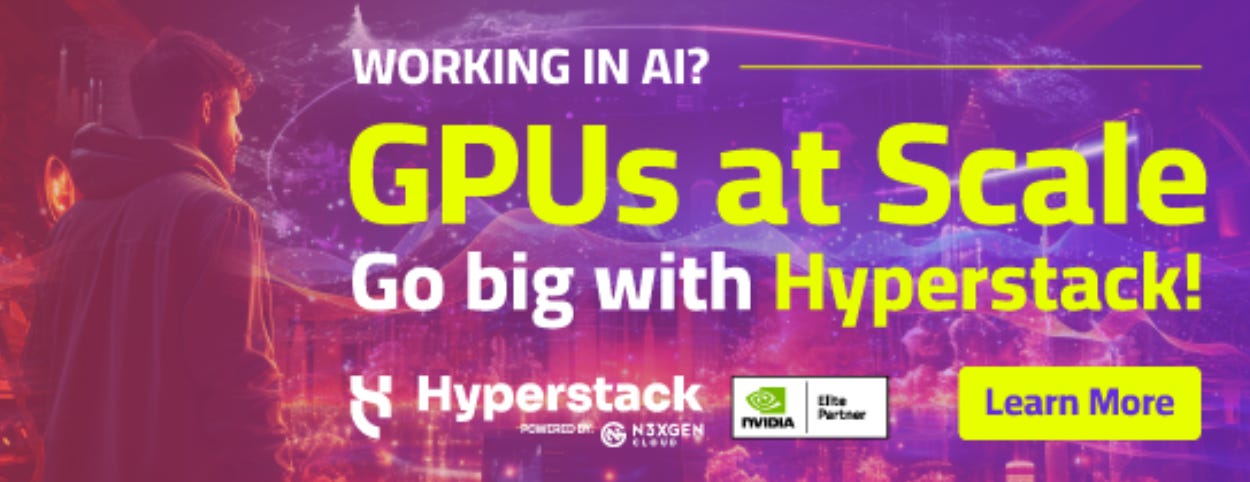🔮Infrastructural power & AI; sensory upgrade; modern warfare; IEA’s ambition; Wikiracing ++ #442
Your insider guide to AI and exponential technologies
The latest from Exponential View
Promptpack: How to improve your use of AI with AI-enhanced prompting,
The brain — The last fortress of humanity, with Professor Nita Farahany
🚀 Thanks to our sponsor Hyperstack, powered by NexGen Cloud, NVIDIA Elite Partner.
Sunday chart: Who owns the cloud, scripts the code
A good report on Computational Power in AI by the AI Now Institute highlights the increasing verticalisation of control of the AI stack by the big tech companies. This is happening through cross-investments, like the recent Amazon investment in Anthropic. These companies are intensifying their already-concentrated control over the computing hardware and cloud infrastructure that is essential for building and deploying larger AI systems. And AI Now’s report gives a decent overview of other spots of concentration, for example in chip fabrication.
While these firms may appear to compete, their deep interlinkages suggest that their interests are in fact closely aligned. Each big tech firm is establishing a keiretsu, but with the deep scale and technical capabilities that give them economic power but also state-like capabilities across many things we might reasonably consider public domain or public goods.
With their tightening hold on compute infrastructure, these companies control our future interface with reality in much the same way they control the interface to information through social media. Except, this time, information is further contorted through LLMs. This is not necessarily a bad thing. It can make access to and synthesis of information easier. Yet, democracy has limited say on tech’s pathway, the people’s interests have limited representation, while those of big tech look to further encroach.
Philosophers have long understood the dangers of the concentration of power, viz Plato the powerful “declare what they have made – what is to their own advantage – to be just”. The U.S. Constitution sought to limit the power of any groups based on Montesquieu’s articulation of separation of powers. History shows that concentration of power rarely serves the public interest.
And corporate concentration of power has a track record of disproportionately impacting groups further from the source of power. Consider, for example, overseas exploitation corporations, like the East India Company or the Holland’s Verenigde Oostindische Compagnie; or more recently the activities of America’s ITT Corporation in destabilising Salvador Allende’s legitimate government in Chile, or even Boeing’s slow encroachment in de facto self-certifying the deathly 737 Max. In a nutshell, firms are best in properly competitive markets.
This is a political issue that requires new solutions, not just traditional antitrust regulation. The UK is aiming to break through on this front, pushing model makers to give government researchers access to the underlying technology. AI Now also offers several other recommendations, such as establishing more transparent guidelines for breaking down vertical linkages across the AI stack and ensuring fair, non-discriminatory access for competitors at crucial junctions within the stack.
Key reads
In today’s Key Reads, we add context to the three top stories of the week for us — full assessment is open to paying subscribers:
What is Jony Ive planning next?
Could drone warfare prompt a return to conscription in the US?
How has the IEA updated its net zero recommendations?
🚀 Today’s edition is supported by our sponsor Hyperstack, powered by NexGen Cloud.
Access NVIDIA’s H100s, A100s, L40s and more to launch GPU-Accelerated virtual machines with Hyperstack. Dive into a platform fine-tuned for optimal GPU performance, offering:
Ready-to-deploy flavours and bespoke configurations
Seamless software deployment with managed Kubernetes
First-class API built for GPU cloud workloads
Transparent billing: Pay per minute - pay only for what you use
5x more efficient and up to 75% more cost-effective when compared to legacy providers.
Market data
Earthworms contribute to 6.5% of global grain production worldwide each year.
A weakening euro? The percentage of global payments made in euros through SWIFT has decreased from 38% at the beginning of the year to 23%.
Oslo is set to have a fully electric bus fleet, four years ahead of schedule.
In recent French elections, ‘the geosocial class’—defined by a commune’s size and socioeconomic makeup— explained over 70% of the voting variance between municipalities. This is up from 50% in 1981 and 30% in 1848. Adding factors relating to identity and immigration, only slightly increases the explanatory power to 72-73%, emphasising the strong influence of geosocial factors.
CEO pay has soared 1,209.2% since 1978 compared with a 15.3% rise in typical workers’ pay in the U.S.
Short morsels to appear smart at dinner parties
🤖 Tesla Optimus can now sort objects like a toddler (but seriously, it’s impressive).
🔍 The Atlantic developed a search tool to see which authors were used to train the machines.
⚖️ Can democratic deliberation make people more positive about the future?
🦠 Covid lockdowns have altered babies’ microbiomes.
⏳ Is the physics of time actually changing?
🥤 A new flavour of Coke… brought to you by you-know-what.
🦀 Scientists are releasing an army of crabs to save Florida’s dying reef.
🏁 The internet’s greatest sport. Wikiracing.
🌐 Zuck finds meaning in the Metaverse. A really impressive demo of the new VR tech.
End note
I’ll be in Dubai participating in the Annual Meeting of the Global Future Councils of the World Economic Forum in mid-October. If you are attending dropping me a line on the internal messenger thing, and let’s try to connect.
Azeem
P.S. Thanks to hundreds of members who shared feedback with our team through the survey last week!
What you’re up to — community updates
Reshma Sohoni, founder of Seedcamp, was interviewed by Sifted.
John Danaher has started a new podcast on technology ethics.
Share your updates with EV readers by telling us what you’re up to here.


